Trenton Bat Removal
Welcome to Trenton Bat Removal! We are New Jersey bat removal specialists. It is important to know that bats are protected by New Jersey law, and are beneficial animals to have in the environment. We do not kill any bats during our bat removal process. Never hire a pest control company or anyone who says they are a Trenton bat exterminator. For correct and effective bat removal, you want a company that specializes in humane bat colony extraction. Our process is not only the only legal method in New Jersey, but it is the most effective. We have a 100% success rate in our bat control process. We perform our industry-best 32-point inspection of your house or building, and seal shut all bat entry holes down to 1/4 inch as part of the removal process, during which we remove the colony via special one-way exclusion devices specific to your architecture. Once all bats are safely out, we permanenetly bat-proof the structure. We also provide guano (bat droppings) removal and decon. Click on our Trenton Bat Control Prices page to find out more about our prices for bat control work. We work 24/7/365, and would love to talk to you about your bat problem. Call us any time at 609-528-4495 to discuss it, discuss our pricing, and if you wish, set up an appointment at your convenience, often same-day.
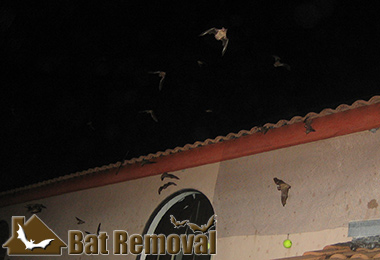
Trenton Building and Attic Inspections

No-kill New Jersey Bat Extraction
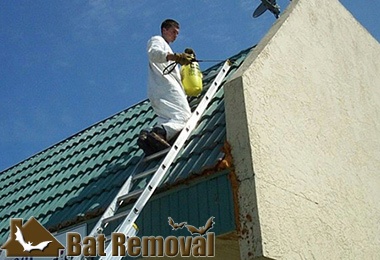
Guano Cleanouts - Serving all of New Jersey
Call 24/7 to discuss your bat problem.
Same-day or next-day appointments.
32-point inspection of your property.
Written estimates for bat removal project.
Fully state licensed and insured.
Residential and commercial service
100% no-kill Trenton bat extraction
Complete bat-proofing of your building
Compliance with all New Jersey, federal laws
Guano removal and attic decontamination
Our Service Range - 609-528-4495
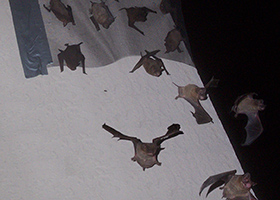
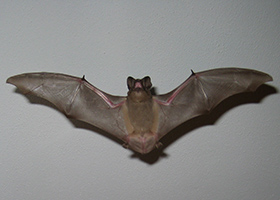
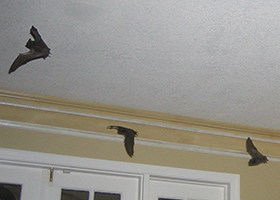
Understanding the Value of Bats that Eat Insects
Perhaps one of the best ways to convince people to conserve bat is to educate them about the capacity of the bats to control the population of harmful insects. According to the study, one bat can devour at least a thousand of insects in an hour. The mother bat that is nursing her young ones will need to hunt more to ensure that the baby bat will be properly nourished. They can catch an average of 4,000 mosquitoes per night.
Can Bats Eat Billions of Insects?
The little brown bat is known for its varied eating habit. Some of the pests that they can eat include beetles, moths, and mosquitoes. Imagine this, if a single bat in the community will eat at least 500 mosquitoes per night, imagine how many insects can a colony with 100 bats eat. Nonetheless, you still want to know if bats can really eat an enormous number of insects.
Texas is the home of the Bracken Cave that houses more than 20 million bats. Based on the report, one Mexican Free-tailed bat can eat at least 10 grams of these harmful insects per night. Some people may think that the number may not be that much. However, once you consider the appetite of the entire colony. The total weight of insect that they can devour is around 220 tons which is equivalent to 55 elephants.
The Benefits of Having an Insectivore Bat in Your Community
Only 1/100 insects will be harmful towards humans. They will be carrying diseases and will destroy the crops. Unfortunately, the harmful insects are among the fastest reproducing insects. Without any predators, the population of these insects will swell uncontrollably and cause severe damage to our ecosystem. When the bats will be able to fulfil their job, the damages that they can cause will be contained. In addition, farmers can avoid the use of pesticide that may enter the food chain.
The pests that will attack the crops of the farmers can lay at least 100 egg per hour. If the bats successfully ingested a female insect before she can lay eggs, the bats will be able to protect the farmers form the offspring of these insects. You probably understand now how bats is important in keeping the health of our ecosystem.
How Economically Important Are the Bats?
In order to learn about the economic importance of the bats and their eating habit, it is important to know their impact towards the agricultural setting. Bats are probably the most important predator due to their habit of consuming chinch bugs, leafhoppers, crickets, moths, mosquitoes, and beetles. Most of them will spread diseases and they are considered agricultural pests. According to the latest estimates, the bats help the farmers save about $3.7-$22.9 billions per year.
Sadly, there has been a great decline in the population of the bats over the past few years. Oftentimes, the reason behind their dwindling population is caused by humans. Due to urbanization, natural roosting place of the bats have been destroyed.

